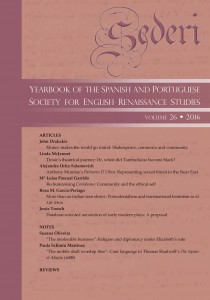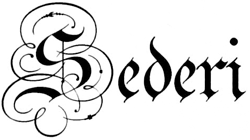
Sederi 26
Sederi 26 — 2016
EDITOR
Ana Sáez-Hidalgo
MANAGING EDITOR
Francisco J. Borge López
REVIEW EDITOR
María José Mora
ISSN 1135-7789
Mª Luisa Pascual Garrido, “Re-humanising Coriolanus: Community and the ethical self.” SEDERI 26 (2016): 85–107.
DOI: https://doi.org/10.34136/sederi.2016.4 Download PDF
Abstract
In this article I analyse subjectivity in Coriolanus taking as a starting point the traditional antagonism between essentialist humanism and cultural materialism. While mainstream humanism has approached Shakespeare’s plays stressing the transcendental nature and autonomy of the subject, cultural materialism has challenged that assumption by underscoring the actual lack of freedom of the individual whose actual choices are determined not by the inherent nature of the hero but by social and political forces. My aim is to try to bridge the gap between two seemingly divergent ways of understanding subjectivity by adopting a more sceptical form of humanism, which is based on both the acceptance of the limits and the vulnerability of human beings (Mousley 2007) and recent developments in communitarian theory and biopolitics (Nancy 1991, Agambem 1995, Butler 2006, Esposito 2012). I contend that Coriolanus is an embodiment of humanity, a singular being capable of making an ethical choice at the risk of his own death.
Keywords: William Shakespeare; Coriolanus; subjectivity; humanity; ethical community; vulnerability; singularity of being.
References
Agambem, Giorgio. 1998 (1995). Homo Sacer: Sovereign Power and Bare Life. Standford: Standford University Press.
Arnold, Oliver. 2007. The Third Citizen: Shakespeare’s Theatre and the Early Modern House of Commons. Baltimore: John Hopkins University Press.
Belsey, Catherine. 1980. Critical Practice, London: Routledge.
Bliss, Lee. 2010. “Introduction.” William Shakespeare, Coriolanus. 1-121. Cambridge: Cambridge University Press.
Bradley, A.C. 1991 (1904). Shakespearean Tragedy: Lectures on Hamlet, Othello, King Lear, Macbeth. London: Penguin.
Butler, Judith. 2006. Precarious Life: The Powers of Mourning and Violence. New York: Verso.
Calderwood, James. 1996. “Coriolanus: Wordless Meanings and Meaningless Words.” SEL: Studies in English Literature, 1500–1900 6: 211–224.
Dollimore, Jonathan. 1989 (1984). Radical Tragedy: Religion, Ideology and Power in the Drama of Shakespeare and his Contemporaries. Hempstead: Prentice Hall.
Esposito, Roberto. 2012. Terms of the Political: Community, Immunity, Biopolitics. Translated by Rhiannon Noel and introduction by Vanessa Lemm. New York: Fordham.
Goddard, H. C. 1960 (1951). The Meaning of Shakespeare, vol. 2, University of Chicago Press: London.
Hadfield, Andrew. 2005. Shakespeare and Republicanism. Cambridge: Cambridge University Press.
Heinemann, Margaret. 1994. “How Bretch Read Shakespeare.” In Political Shakespeare: Essays in Cultural Materialism, edited by Jonathan Dollimore and Alan Sinfield, 226–255. Manchester: Manchester University.
Knight, G. Wilson. 1947. The Crown of Life: Essays in Interpretation of Shakespeare’s Final Plays. London: Methuen.
Knight, G. Wilson. 1995 (1930). The Wheel of Fire: Interpretations of Shakespearean Tragedy with Three New Essays. London: Routledge.
Kuzner, James. 2007. “Unbuilding the City: Coriolanus and the Birth of Republican Rome.” Shakespeare Quarterly 58 (2):174–199.
McDonnell, Myles. 2006. Roman Manliness: Virtus and the Roman Republic. Cambridge: Cambridge University Press.
Mousley, Andy. 2007. Re-Humanising Shakespeare: Literary Humanism, Wisdom and Modernity. Edinburgh: Edinburgh University Press.
Patterson, Annabel. 1989. Shakespeare and the Popular Voice. Oxford: Basil Blackwell.
Nancy, Jean-Luc. 1991. The Inoperative Community. Edited by Peter Connor. Minneapolis: University of Minnesota.
Shakespeare, William. 2010 (1623). Coriolanus. Edited by Lee Bliss. Updated edition. Cambridge: Cambridge University Press.
